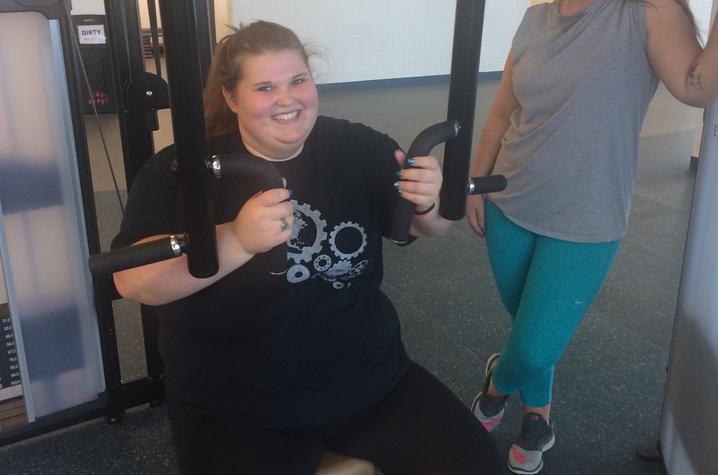Fitness is Important Part of Recovery in UK Adolescent Substance Abuse Program

LEXINGTON, Ky. (Sept. 20, 2016) – Julia Sparks was the first person in the University of Kentucky's Adolescent Health and Recovery Treatment and Training (AHARTT) clinic to complete one of her smart goals, graduating from high school. Not only has she accomplished that goal, she’s begun working toward accomplishing a new one, getting her degree in hospitality management from Sullivan University.
Goals are an important part of the treatment plan for adolescents in recovery at the UK Psychiatry Clinic for Adolescent Substance Abuse. Each week, patients set goals and when they accomplish them they are rewarded with gift cards. Peer support is another important tool used in the clinic. Peer support specialists, like Kelli Fullenlove, have lived experience that allows them to relate to young patients.
An activity that focuses on setting goals and celebrating when they’re accomplished is fitness. People set a goal of running a faster pace, lifting a certain amount of weight or riding their bike for a specific distance. It makes sense then, that fitness would be incorporated into the treatment plan for adolescents.
Planning for the Wellness Program within AHARTT began in the Fall 2015 and was incorporated in January 2016. The program includes a Fitbit, gym membership to the YMCA of Central Kentucky, body analysis and a workout buddy in the form of a peer support specialist.
Each Tuesday and Thursday, Sparks, Fullenlove and a group from the clinic go to the gym and spend time working out and talking. This setting, outside of the clinic, provides a more relaxed space for sharing, “You can be more open at the gym, there’s not a lot of people around” Sparks said. The gym also decreases the pressure adolescents can feel to talk during a meeting. Instead, between sets or runs on the treadmill they can stop and check in and have a more casual conversation.
Fullenlove shared how leading a healthy lifestyle helps in her recovery, “It changes the way you feel; you start to feel better about yourself.” That’s incredibly important because, according to Fullenlove, “when you’re in active addiction, you feel terrible about yourself.” Sparks and Fullenllove are already feeling the benefits of their new fitness routines.
When Sparks feels her time at the AHARTT clinic is done, she’ll always have the support of someone who has been where she’s been and can relate to issues she’s having related to her recovery. The Wellness Program in the clinic means she’ll also have a gym partner to keep helping her achieve her goals.
UK is the University for Kentucky. At UK, we are educating more students, treating more patients with complex illnesses and conducting more research and service than at any time in our 150-year history. To read more about the UK story and how you can support continued investment in your university and the Commonwealth, go to: uky.edu/uk4ky. #uk4ky #seeblue
MEDIA CONTACT: Olivia McCoy, olivia.mccoy1@uky.edu, (859) 257-1076
###




